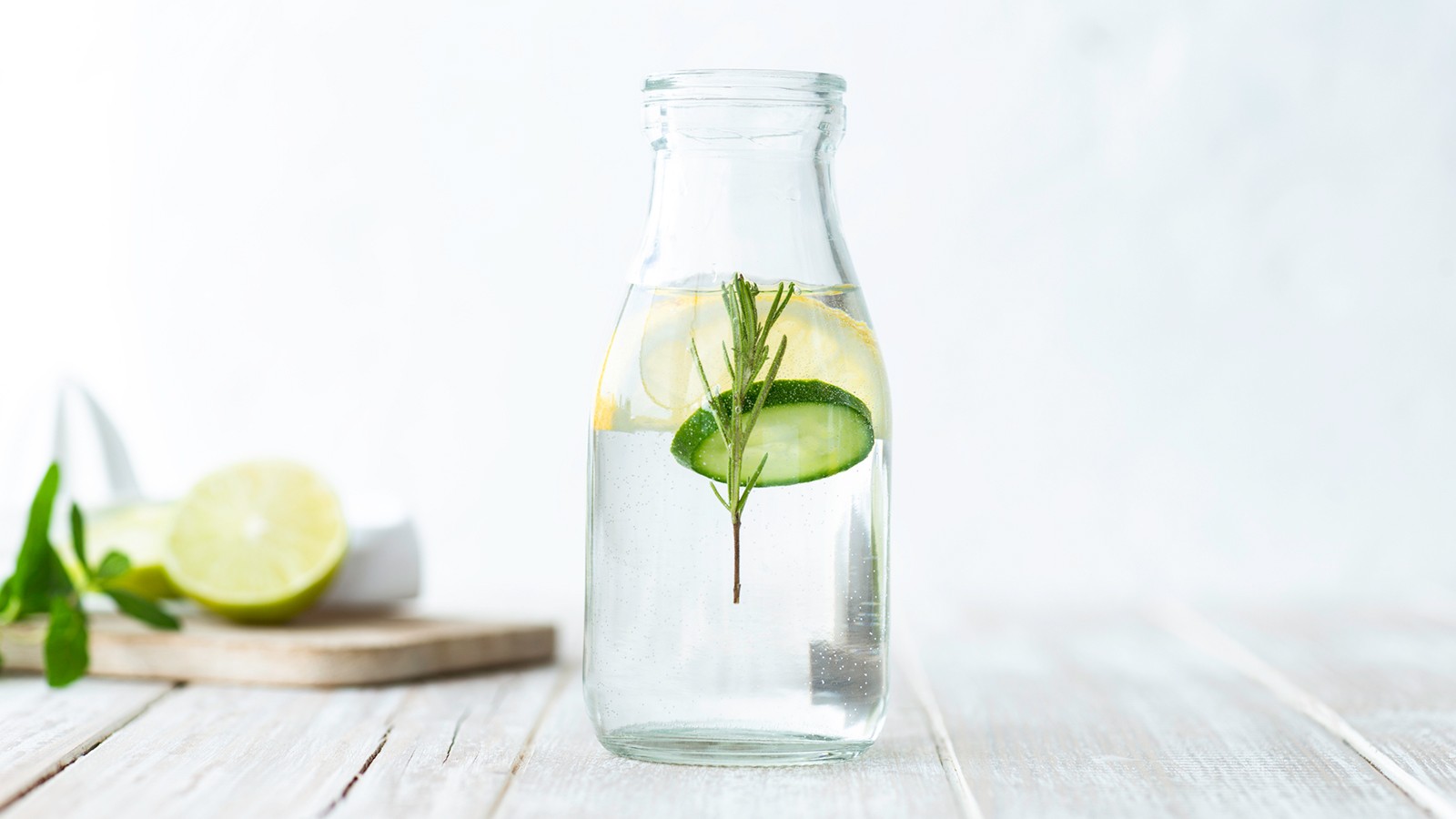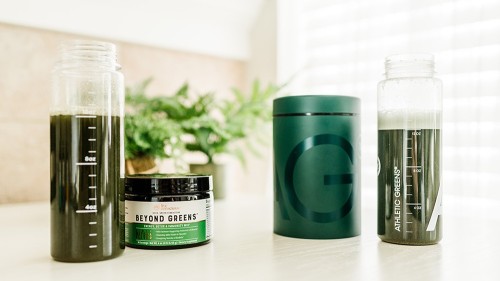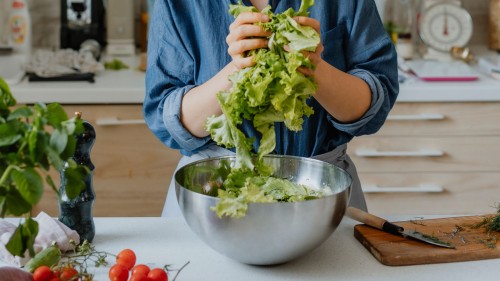How to Detox Naturally in 9 Easy Steps
Published on January 21, 2022
Medically Reviewed by Ana Reisdorf, MS, RD
Detoxification involves the use of various methods to reduce harmful toxins in the body. If you’re in need of a detox, there are several natural ways to go about it.


The words detoxify, detoxification, and “detox” are widely popular terms these days. The process of detoxing typically involves the use of special diets, cleanses, supplements, or lifestyle practices to rid your body of unwanted toxins.
The intended outcome for most people looking to detox is to improve health, feel better, or lose weight.
Maybe you ate too much sugar around the holidays and need a reset, or you went on an extended vacation and drank one too many margaritas.
While fancy detoxes and cleanses may sound appealing, they should be looked at with a critical lens. This is because some of them can cause harmful side effects.
Fortunately, there are safe, natural detox methods out there that don’t involve these risks.
If you’re looking to learn how to do a detox naturally, we got you covered. But first, it’s important to understand the meaning of detox and what is happening in the body during a detox.
What Is Detoxification?
The meaning of detoxification, otherwise known as a detox cleanse, is the process intended to remove harmful toxins from the body.
What are toxins in the body? These are synthetic chemicals, heavy metals, processed foods, and alcohol thought to pose harm to the body.
These toxins can be external and in the environment around us, or internal, such as highly processed foods, added sugar, and alcohol.
Too many of these toxins can pose health risks, and thus many people are interested in learning ways to remove them from the body.
But extreme detox programs may not be necessary to remove these harmful substances.
The body has a natural detoxification system already in place and involves teamwork from organs such as the liver, kidneys, digestive tract, skin, and lungs.
Therefore, if these organs are functioning properly, in theory, the body should be able to detoxify just fine once you stop consuming harmful toxins.
However, there is a huge market for detox programs claiming to cleanse the body and flush your system in a matter of days. Some of these methods include:
- Fasting and restricting certain foods
- Liver cleanses
- Colon cleanses
- Juice cleanses
- Detox supplements and herbs
There is really no evidence behind these detox methods. If you want to “detox,” there are healthier ways to help your body do what it does naturally.
Here are 9 natural ways to detox that don’t involve complicated cleanses or severe food restrictions.
1. Drink More Water
Drinking water offers an array of health benefits, including detox.
How does water detox your body? It does this through the digestive process.
During the digestive process, your body breaks down nutrients to be used for energy. Many of these waste products created through this breakdown are then supposed to be removed from your body.
When you drink more water, it helps flush these waste products out of your system through urination, breathing, or sweating, so they don’t build up to unhealthy amounts. (1)
This can explain why you probably feel so much better and have more energy when adequately hydrated. I see this time and time again in my clients who drink more water, which also can provide more motivation to keep doing it.
Summary
Water serves many important functions in the body, including serving as a way to cleanse your body of unwanted toxins.
Aim to drink at least 64 ounces of water per day or more, depending on your age, sex, and activity level.
2. Limit Alcohol
Limiting or avoiding alcohol is one of the best ways to detox.
Alcohol is a known toxin, especially if it is consumed in excess. Your liver is responsible for breaking down alcohol to a less harmful form.
If your alcohol consumption is above the recommendation of 1–2 drinks per day, you may be in need of an alcohol cleanse.
Too much alcohol in the body puts extra strain on your liver, where it may not be able to keep up with the demand. This can cause the harmful toxins present in alcohol to build up in the body.
If you’ve ever experienced a hangover after drinking, you likely had toxins built up in the body. In order to detox, you need to give your liver (and entire body!) a break from alcohol to thoroughly cleanse your system.
Summary
Limit alcohol to 1–2 drinks per day, if at all. This will provide a healthy cleanse and enable your liver to provide the best natural detox possible.
3. Reduce Intake of Processed Foods and Sugar
Consuming too many highly processed, packaged foods and added sugar can make it hard for your organs to remove toxins from your body. (2)
This includes any food in a box, packaged baked goods, sugary beverages, or fast food that is highly processed.
A diet high in these foods puts you at higher risk for certain health conditions such as diabetes, heart disease, and obesity. Having these conditions puts strain on the organs involved in detoxifying your body.
For example, eating too much added sugar in the diet can increase the risk of fatty liver, which impairs your liver’s ability to function properly. (3)
Too much sugar can also be addicting for some people, making it harder to maintain a healthy weight.
Summary
The best detox diet involves limiting added sugar, sugary beverages, and processed foods as much as possible.
To do this, focus on consuming primarily whole foods and only including packaged food once a day if needed.
4. Eat More Antioxidant-Rich Foods
A good detox is not all about what to limit; it’s also about what to eat more of.
Eating more antioxidant-containing foods like bright-colored fruits and vegetables, nuts, coffee, green tea, and a bit of dark chocolate can serve as a whole-body detox.
The antioxidants in these foods help prevent harmful toxins in the environment from damaging our cells. Therefore, the more we have of them, the better.
These natural detox foods can protect us from diseases like heart disease and cancer, which can affect our ability to cleanse the system. (4)
Summary
Eating antioxidant-rich foods like fruits, vegetables, nuts, coffee, green tea, and dark chocolate regularly is one of the best natural cleanses. To control calories, stick to 1–2 ounces of dark chocolate per day.
5. Get Physical
Exercise is one of the most important pieces to a healthy detox plan. Not only does exercise support your overall health, but it is also one of the best ways to detox your body.
Regular exercise reduces inflammation, which can help support your body’s natural detoxification process.
Exercise also reduces your risk of several chronic conditions that can increase toxin build-up in the body. (5)
When it comes to exercise, doing something you enjoy will bring the most significant benefits and make it more likely that you will stick to it.
If you’re new to exercise, speak to your doctor first to determine where to start.
Summary
Regular exercise is one of the best natural cleanses and detox methods.
The general recommendation for most people is to do at least 150–300 minutes a week of moderate-intensity exercises, such as walking, or 75–150 minutes a week of vigorous-intensity, such as running.
6. Go Light on the Salt
If you’ve ever eaten too much salt, you may have felt it physically the next day. This is because too much salt, or sodium, in the diet can cause water retention, leaving you feeling bloated and thirsty.
When you retain water, your body keeps harmful toxins in the body for longer. The ideal scenario is to limit salt intake in the first place to prevent water retention.
However, if the damage is already done, you can quickly fix the problem by drinking more water.
While this sounds counterintuitive if you’re already retaining water, drinking more water will actually help rid your body of the toxins that have built up.
Most of us consume too much salt, and it mainly comes from processed foods, not the salt shaker.
While you should limit adding salt to your food, it’s also important to reduce your intake of fast foods and processed frozen and canned products.
These processed foods often contain a lot of added salt (much of it that you can’t even taste!) that will cause fluid retention.
According to the American Heart Association, aim to limit your sodium intake to 2,300 milligrams per day, (6)
Lastly, eating more potassium-rich foods can also offset water retention. These include fruits and vegetables such as potatoes, squash, bananas, and spinach.
Summary
Reduce your intake of processed fast food, canned, and frozen products with added salt, and increase your intake of potassium-rich foods.
7. Prioritize Sleep
Getting quality sleep is a must when it comes to detoxing your body.
While you sleep, your body recharges and removes toxic waste products that build up throughout the day. (7)
If you don’t sleep enough or get poor quality sleep, your body doesn’t have the chance to perform these detoxifying functions. These toxins can then build up and lead to health problems.
While everyone’s sleep requirements are a bit different, the general recommendation is to get at least 7–9 hours per night. (8)
If you have trouble sleeping, try establishing a healthy sleep routine where you shut off all electronics, read a book, and reduce bright lights within the last 30 minutes before bed.
Summary
Proper sleep is paramount to cleanse your body of toxins. Aim for 7–9 hours per night, and stick to a consistent bedtime routine for the best results.
8. Up Your Fiber
Eating more fiber in the diet is one of the best ways to detoxify your body.
Fiber helps aid in digestion and facilitates the removal of toxins in the body through stool. A lack of fiber can cause constipation, keeping harmful toxins in the body longer. (9)
Fiber also helps feed the healthy bacteria in our gut, which can also detoxify your body of harmful toxins. (10)
Good fiber sources include fruit, vegetables, seeds, nuts, and whole grains.
Summary
Eating more fiber-rich foods can support a healthy digestive tract and help to remove toxins from the body. Aim for at least 25 grams of fiber per day to get the most benefits.
9. Reduce Stress
Chronic stress reduces the body’s ability to detox naturally.
If you’re constantly stressed, you are more likely to have trouble sleeping, have poor food choices, or lack the motivation to exercise. (11)
All of these factors play a role in a total body detox, and therefore managing stress can play a role in improving them.
If you’re feeling stressed, try regular stress-reducing techniques such as meditating, yoga, massage, or deep breathing.
Summary
Reducing your stress as much as possible is one of the best detox cleanses. Start with just 10 minutes a day of stress-reducing techniques to get those healthy endorphins flowing.
Frequently Asked Questions
What is detoxification?
Detoxification is the process intended to remove harmful substances from the body.
Our body has a natural detoxification system that involves the liver, kidneys, skin, and digestive tract working together in order to do this.
There are many detox cleanses and programs out there promoting methods that may not be healthy or sustainable.
What are some natural ways to detox that don’t involve expensive programs?
Drinking more water, eating more antioxidants and fiber, exercising, and limiting alcohol and processed foods can all provide a body detox.
Getting proper sleep and minimizing stress can also be effective detoxification methods.
What is the fastest way to detox?
When it comes to detoxing, there is no magic bullet that will detox your body immediately.
To truly detox, you need to follow a healthy lifestyle regularly to prevent excess toxins from building up in the first place.
However, if you are retaining fluids, drink a lot of water to flush it out. This may provide a quick detox that you can feel.
Can you tell me how to detox your body for weight loss?
If your goal is to lose weight, drinking plenty of water, exercising, and eating plenty of fruits and vegetables will provide detoxification and support weight loss. There is no single pill or supplement that will do this.
What foods help flush out your system?
Foods high in fiber, such as fruits, vegetables, nuts, seeds, and whole grains, support healthy digestion and the removal of toxins from your body.
Are there detox supplements or detox programs I can purchase that work?
There is no evidence that any detox supplement or paid program actually helps detoxify the body and improve health. Instead, it is recommended to detoxify naturally through diet, exercise, and healthy lifestyle changes.
The Bottom Line
There are tons of detox programs and diets out there claiming to be a magic cleanse for your body.
The gravitational pull to try these quick-fix programs can feel incredibly strong, but there is virtually no evidence to support their safety or effectiveness.
The good news is you can support your body’s natural detoxification process by eating plenty of fiber and plant-based foods, staying hydrated, limiting alcohol, staying active, and managing your stress in healthier ways.
At WellnessVerge, we only use reputable sources, including peer-reviewed medical journals and well-respected academic institutions.
- Water, Hydration and Health:
https://www.ncbi.nlm.nih.gov/pmc/articles/PMC2908954/ - Controversies about sugars: results from systematic reviews and meta-analyses on obesity, cardiometabolic disease and diabetes:
https://www.ncbi.nlm.nih.gov/pmc/articles/PMC5174149/ - Fructose and sugar: A major mediator of non-alcoholic fatty liver disease:
https://pubmed.ncbi.nlm.nih.gov/29408694/ - Food Antioxidants and Their Anti-Inflammatory Properties: A Potential Role in Cardiovascular Diseases and Cancer Prevention:
https://www.ncbi.nlm.nih.gov/pmc/articles/PMC5456284/ - Health Benefits of Exercise:
https://pubmed.ncbi.nlm.nih.gov/28507196/ - Sodium in Your Diet:
https://www.fda.gov/food/nutrition-education-resources-materials/sodium-your-diet - Neuroscience. Sleep: the brain's housekeeper?:
https://pubmed.ncbi.nlm.nih.gov/24136944/ - Recommended Amount of Sleep for a Healthy Adult: A Joint Consensus Statement of the American Academy of Sleep Medicine and Sleep Research Society:
https://www.ncbi.nlm.nih.gov/pmc/articles/PMC4434546/ - Dietary Fiber, Gut Microbiota, and Metabolic Regulation—Current Status in Human Randomized Trials:
https://www.ncbi.nlm.nih.gov/pmc/articles/PMC7146107/ - The gut microbiota: a major player in the toxicity of environmental pollutants?:
https://www.ncbi.nlm.nih.gov/pmc/articles/PMC5515271/ - The effects of chronic stress on health: new insights into the molecular mechanisms of brain–body communication:
https://www.ncbi.nlm.nih.gov/pmc/articles/PMC5137920/






